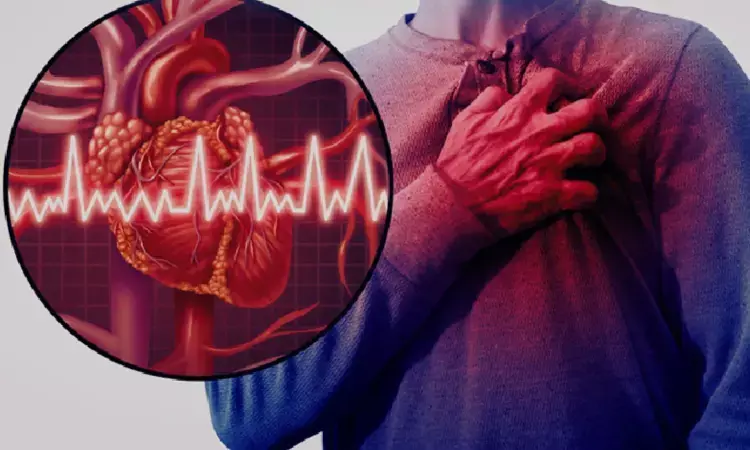- Home
- Medical news & Guidelines
- Anesthesiology
- Cardiology and CTVS
- Critical Care
- Dentistry
- Dermatology
- Diabetes and Endocrinology
- ENT
- Gastroenterology
- Medicine
- Nephrology
- Neurology
- Obstretics-Gynaecology
- Oncology
- Ophthalmology
- Orthopaedics
- Pediatrics-Neonatology
- Psychiatry
- Pulmonology
- Radiology
- Surgery
- Urology
- Laboratory Medicine
- Diet
- Nursing
- Paramedical
- Physiotherapy
- Health news
- Fact Check
- Bone Health Fact Check
- Brain Health Fact Check
- Cancer Related Fact Check
- Child Care Fact Check
- Dental and oral health fact check
- Diabetes and metabolic health fact check
- Diet and Nutrition Fact Check
- Eye and ENT Care Fact Check
- Fitness fact check
- Gut health fact check
- Heart health fact check
- Kidney health fact check
- Medical education fact check
- Men's health fact check
- Respiratory fact check
- Skin and hair care fact check
- Vaccine and Immunization fact check
- Women's health fact check
- AYUSH
- State News
- Andaman and Nicobar Islands
- Andhra Pradesh
- Arunachal Pradesh
- Assam
- Bihar
- Chandigarh
- Chattisgarh
- Dadra and Nagar Haveli
- Daman and Diu
- Delhi
- Goa
- Gujarat
- Haryana
- Himachal Pradesh
- Jammu & Kashmir
- Jharkhand
- Karnataka
- Kerala
- Ladakh
- Lakshadweep
- Madhya Pradesh
- Maharashtra
- Manipur
- Meghalaya
- Mizoram
- Nagaland
- Odisha
- Puducherry
- Punjab
- Rajasthan
- Sikkim
- Tamil Nadu
- Telangana
- Tripura
- Uttar Pradesh
- Uttrakhand
- West Bengal
- Medical Education
- Industry
Lipoprotein(a) and NAFLD linked to non fatal MI in Diabetic Individuals, finds study

USA: In a groundbreaking development in the realm of cardiovascular health, a recent study has shed light on a significant association between serum lipoprotein(a) levels, non-alcoholic fatty liver disease (NAFLD), and the risk of non-fatal myocardial infarction (heart attack) in individuals with diabetes mellitus. Conducted by a team of researchers from prominent institutions, the findings offer crucial insights into the complex interplay of metabolic factors contributing to cardiovascular complications in diabetic patients.
The retrospective study, using data from the National Health and Nutrition Examination Survey (NHANES) III, revealed that individuals with diabetes were more likely to report a history of myocardial infarction (MI) if they also had high levels of serum lipoprotein(a), or Lp(a), or advanced liver fibrosis.
"Multivariate analysis showed that the risk for a non-fatal MI more than doubled when levels reached 50 mg/dL, a level that current guidelines consider to be elevated, and beyond, compared with diabetes patients with the lowest Lp(a) levels (<10 mg/dL)," Avica Atri, MD, of Jefferson Einstein Hospital in Philadelphia, reported at the annual American Association of Clinical Endocrinology (AACE).
As well, advanced liver fibrosis associated with NAFLD was linked with a 70% higher risk for a non-fatal MI (aOR 1.70).
Patients who self-reported a history of myocardial infarction had higher Lp(a) levels than those who did not report an MI (mean 30.7 versus 24.2 mg/dL, respectively) and were more likely to have advanced liver fibrosis (13.5% versus 4.5%).
The patients with advanced liver fibrosis tended to have lower mean Lp(a) levels versus those without advanced fibrosis (13.6 versus 25.9 mg/dL), even among the subset with a prior MI (8.6 versus 34.2 mg/dL).
Diabetes mellitus, a chronic metabolic disorder characterized by elevated blood sugar levels, is known to significantly increase the risk of cardiovascular diseases, including myocardial infarction. However, the specific mechanisms underlying this heightened risk have remained a subject of extensive research.
Lp(a) is produced by the liver circulating levels in the body are determined by genetics. It is an established independent risk factor for atherosclerotic cardiovascular disease (ASCVD). Growing evidence suggests NAFLD is linked with heart disease as well, the relationship between Lp(a), NAFLD, and the MI risk has not been studied well in patients with diabetes mellitus.
The cross-sectional analysis presented by Atri included a weighted sample of 3,330,795 people with diabetes ages 35 and older from the NHANES III database (1988 to 1994) who had Lp(a) data collected.
The mean participants' age was 62 years; 59% were women, and the median HbA1c was 7.7%. Non-fatal MI prevalence was 13.3%. 18% of patients met the criteria for advanced liver fibrosis associated with NAFLD (a score of 2.67 on the Fibrosis-4 scale).
A higher proportion of patients in the MI group had lipoprotein (a) levels over 50 mg/dL (about 30% versus 19% in those without an MI).
The study's limitations included its cross-sectional nature and that because it is based on interviews, there is a possibility of recall bias. Furthermore, given the study design, fatal MIs could not be assessed for an association with Lp(a) or advanced liver fibrosis.
Reference:
Atri A "Association between serum lipoprotein(a), NAFLD and risk of non-fatal myocardial infarction in individuals with diabetes mellitus" AACE 2024.
Dr Kamal Kant Kohli-MBBS, DTCD- a chest specialist with more than 30 years of practice and a flair for writing clinical articles, Dr Kamal Kant Kohli joined Medical Dialogues as a Chief Editor of Medical News. Besides writing articles, as an editor, he proofreads and verifies all the medical content published on Medical Dialogues including those coming from journals, studies,medical conferences,guidelines etc. Email: drkohli@medicaldialogues.in. Contact no. 011-43720751


